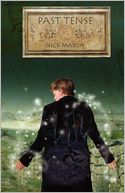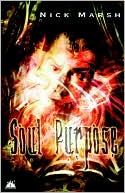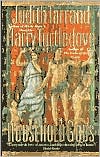 Nick Marsh’s Past Tense is almost two books in one. The first half of Past Tense is science fiction/horror, and it’s pretty much of a sequel to Marsh’s first book, Soul Purpose (reviewed here). The main purpose of chapters 1 through 44 (or I through XLIV) is to provide a reason for the rest: the marvelous time travel feast that gives Past Tense its name.
Nick Marsh’s Past Tense is almost two books in one. The first half of Past Tense is science fiction/horror, and it’s pretty much of a sequel to Marsh’s first book, Soul Purpose (reviewed here). The main purpose of chapters 1 through 44 (or I through XLIV) is to provide a reason for the rest: the marvelous time travel feast that gives Past Tense its name.
The present day bits about the vet Alan Reece and his friends George and Kate, who saved the world from a Lovecraftian-Cthulhu-monster type takeover in the previous book, serve as introduction. The world is going to hell in a handcart again. Alan is not just seeing monsters, he also keeps slipping sideways into a world where Cthulhu seems to be running the place. And this is NOT GOOD.
He’s also being stalked by a couple of guys in ill-fitting suits and rather poor hygiene. When they finally catch up with him, their explanation floors him. They are like him, except from other “Soul Plains”. They are Conduits, with a capital “C”, and so is Alan.
 And they are on Earth to help Alan save it, again. Because that last time Alan saved the Earth, he caught the attention of something nasty, and it wants to spoil things at the Soul Plain level, where only Conduits can fix things. Earth wasn’t even supposed to have a Conduit yet, so Alan is special.
And they are on Earth to help Alan save it, again. Because that last time Alan saved the Earth, he caught the attention of something nasty, and it wants to spoil things at the Soul Plain level, where only Conduits can fix things. Earth wasn’t even supposed to have a Conduit yet, so Alan is special.
About the poor hygiene thing. The other Conduits are just borrowing the bodies of people from Earth. They don’t quite know how to operate the equipment, so to speak. They get the language and general movement, well mostly, but the nuances of hair combing and tooth brushing are pretty much beyond them.
But they can show Alan how bad the problem is. The creature has no physical existence, except what he borrows. But on the Soul Plain level, he consumes Conduits, kills them, and steals their power. And he wants Alan. But he also want the entire Soul Power of the Earth.
The 21st century didn’t work for him. He was drawn to it because that’s where Alan was, but the 21st century doesn’t believe in much anymore, not on a superstitious level. This being needs to be worshipped to manifest. People need to believe in him. So he’s gone back into Earth’s past.
And that’s where the second “book” comes in. The creature has manifested in Britain, during the late period of the Roman occupation, in a fort on Hadrian’s Wall. In order to stop him, Alan has to go back to that same period to stop him from changing whatever piece in history he changed to trigger the wrong turn in history.
Alan has to occupy someone else’s body, just as the other Conduits do. Alan’s spirit, or soul, or Conduitness, or whatever, travels back and occupies the body of a medicus, a surgeon, on the Roman frontier in Britain at around 177 A.D. This glimpse into the life in Roman Britain is absolutely fascinating.
Even better, although worse for her, one of the creature’s minions mistakenly believes that Kate is the Conduit and sends her back to the same place and time. Kate occupies the body of a slave girl.
Between Alan and Kate, they are able to observe Roman life from top to bottom.
Their mission, which they must accept, is to prevent the assassination of the future emperor Commodus. Bastard that Commodus was, his place in history was necessary in order for the Roman Empire to fall at the appropriate time.
The only way they may be able to accomplish this seemingly impossible task is to convince a loyal and rational Roman Centurion that his commander is already dead and that his best friend is a time traveler. Can they do the impossible in time?
Escape Rating B+: I am of two minds. The set up with the part in the 21st century at the beginning, was necessary, but I wanted more of the part in the past. I adored the story once it moved to Roman Britain. Alan’s perspective on life in the fort really shone. It was so ironic that he found his place in life nearly 2,000 years before his birth. And he knew it couldn’t last.
And Kate, trying so hard to hold up at the absolute bottom of society’s ladder, reminding Alan that his current privilege rested on the backs of people like her, on slavery.
 The historic bits reminded me a lot of Judith Tarr and Harry Turtledove’s excellent Household Gods. This was a marvelous book about a woman whose spirit travels back to live on the Danube frontier of the Roman Empire at the same time period as Past Tense.
The historic bits reminded me a lot of Judith Tarr and Harry Turtledove’s excellent Household Gods. This was a marvelous book about a woman whose spirit travels back to live on the Danube frontier of the Roman Empire at the same time period as Past Tense.
There’s a slight hint of the Star Trek Original Series episode City on the Edge of Forever in Kate’s relationship with Lucius the centurion. She wants to save him, to the point where she writes herself a message the second they get back to the 21st century, which she already knows she will find and read at the beginning of this adventure, but he will still attack first and die. And it’s necessary to save the future. And she grieves.
For more of my thoughts on Past Tense, take a look at Book Lovers Inc.






